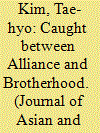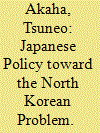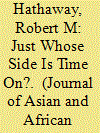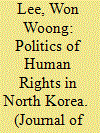| Srl | Item |
| 1 |
ID:
078645


|
|
|
|
|
| Publication |
2007.
|
| Summary/Abstract |
A cost-benefit analysis leads to the conclusion that South Korea's search for non-violent responses to the North Korean nuclear issue causes a dilemma for Seoul. It must balance its security policies toward Washington and Pyongyang, and that dilemma can be resolved only when the North Korean nuclear problem, the most critical and the most difficult hurdle, is resolved. In analyzing critical variables that will determine the success or failure of the six-party talks multilateral approach, this article challenges the central tenet of cooperation theories: if a sufficient number of countries collaborate, they can achieve preventive diplomacy. Cooperation to dismantle the North Korean nuclear program will be difficult due to backsliding (`sanction busting') by concerned countries
|
|
|
|
|
|
|
|
|
|
|
|
|
|
|
|
| 2 |
ID:
078646


|
|
|
|
|
| Publication |
2007.
|
| Summary/Abstract |
North Korea became an urgent problem for Japan as a result of the 1994 nuclear crisis in North Korea, the 1998 missile launch over Japan and the 2003-4 nuclear crisis. At the historic Tokyo-Pyongyang summit in September 2002, both sides acknowledged the need to solve the security issues surrounding the Korean Peninsula through peaceful, multilateral efforts. However, the issue of North Korean abduction of Japanese citizens in earlier decades intensified Japanese sentiment against the North and this issue halted bilateral normalization talks. Japan has participated in six-party talks on the nuclear issue since 2004, but its distinct bilateral interests vis-à-vis North Korea, South Korea and the United States limit its influence in the multiparty engagement.
|
|
|
|
|
|
|
|
|
|
|
|
|
|
|
|
| 3 |
ID:
078644


|
|
|
|
|
| Publication |
2007.
|
| Summary/Abstract |
President Bush's bold National Security Strategy document of September 2002 would appear to have been written with North Korea as much as Iraq in mind. Yet the Bush administration has been uncharacteristically passive in responding to the challenge posed by Pyongyang's nuclear weapons ambitions, especially in comparison with the forceful manner with which the administration dealt with Iraq. In the latter case, Bush mobilized the full weight of military force; seemed disdainful of allies, international institutions and multilateral diplomacy; and moved forward with what his critics deemed reckless abandon. In the case of North Korea, on the other hand, the President has emphasized patience, close coordination with allies and an overall lack of urgency oddly at variance with his `axis of evil' characterization of the regime in Pyongyang, and with dangerous advances in North Korea's nuclear arsenal. This essay attempts to explain the rationale behind the Bush administration's surprisingly relaxed approach to the North Korea challenge
|
|
|
|
|
|
|
|
|
|
|
|
|
|
|
|
| 4 |
ID:
078642


|
|
|
|
|
| Publication |
2007.
|
| Summary/Abstract |
The international community is now paying more attention to `the systemic, widespread and grave violations of international human rights norms' (United Nations ECOSOC Resolution 1503, (1970) See Burgental (1995)) in North Korea due to its chronic famine and nuclear ambition. The issues and engagement politics regarding human rights in North Korea constitute hot political debates. There are three key factors to improve human rights status in North Korea: the consistent international censure; enlarging engagement and people contact through inter-Korean relations; and economic reform in North Korea. These factors are interrelated and affect each other. The crucial point is to press and induce the North Korean regime to a compromise path
|
|
|
|
|
|
|
|
|
|
|
|
|
|
|
|
| 5 |
ID:
078643


|
|
|
|
|
| Publication |
2007.
|
| Summary/Abstract |
In order to better understand and explain North Korea's foreign policy strategies and tactics on the controversy surrounding the nuclear program, this chapter examines the perceptions held by Pyongyang about the neighbouring counties including the United States, Japan, and South Korea. These perceptions are formulated in accordance with North Korea's perception about itself that is generally constructed based on the principle of Juche (self-reliance) and the political and security environment surrounding the Korean peninsula as perceived by Pyongyang itself. North Korea is an unconventional country if one looks from outside but it is not irrational in that it has pursued its own national interest rather effectively for which security is first and foremost. This chapter provides an explanation of North Korean conducts from the perspective of North Korea's own mind-set.
|
|
|
|
|
|
|
|
|
|
|
|
|
|
|
|